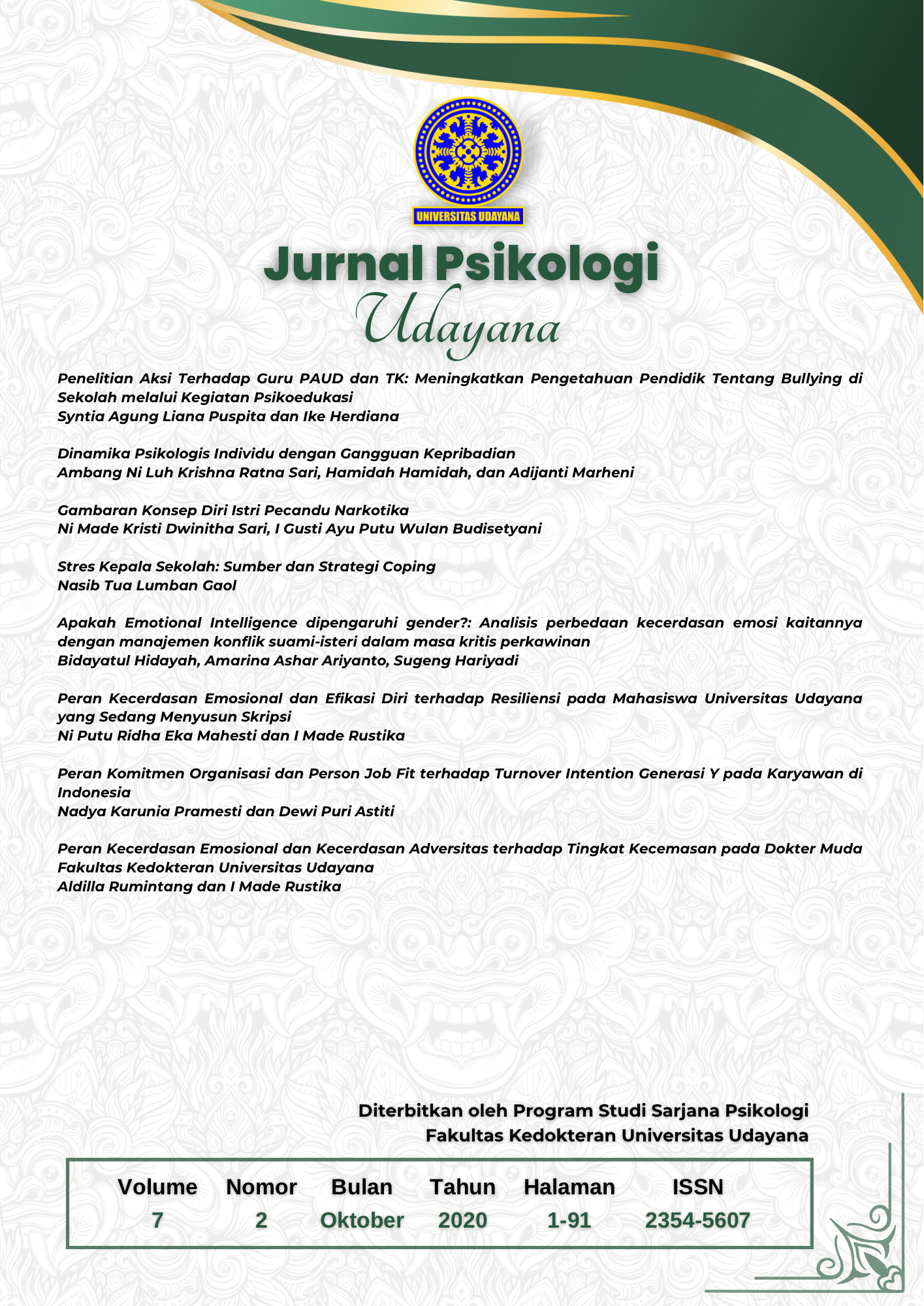Peranan Self-efficacy dan Intelegensi terhadap Prestasi Belajar pada Mahasiswa
Abstract
Efikasi diri merupakan keyakinan individu untuk dapat bertahan dan mencapi tujuan tertentu. Efikasi diri dapat mempengaruhi usaha dan ketekunan mahasiswa dalam menyelesaikan tujuan belajarnya. Dalam konteks perguruan tinggi, salah satu indikasi dari keberhasilan tujuan belajar melalui nilai atau Indeks Prestasi Kumulatif (IPK) yang diperoleh mahasiswa. Selain itu, diperlukan faktor lain yaitu intelegensi individu yang merupakan faktor kognitif, mencakup kemampuan proses berpikir dalam mencari pemecahan masalah serta beradaptasi dengan lingkungan. Untuk mengukur intelegensi dalam penelitian ini menggunakan alat tes Intelegensi yang terstandart yaitu Culture Fair Intelligence Test (CFIT). Penelitian ini bertujuan untuk mengetahui peranan efikasi diri dan intelegensi terhadap prestasi belajar pada mahasiswa. Partisipan dalam penelitian ini adalah 155 mahasiswa aktif di Universitas XYZ dengan rentang usia 18 – 21 tahun. Hasil penelitian ini menunjukkan bahwa adanya pengaruh efikasi diri dan intelegensi sebesar 12,4% terhadap prestasi belajar mahasiswa (R=.352, = .124).
Downloads
References
Bandura, A. (1977). Self-efficacy: Toward a unifying theory of behavioral change. Psychological Reviews, 84(2), 191-215.
El-Anzi, F.O. (2005). Academic achievement and its relationship with anxiety, self-esteem, optimism, and pessimism in kuwait students. Social behavior and personality, 33(1), 90-104
Abadikhah, S., Aliyan, Z., & Talebi, S. H. (2018). EFL students ’ attitudes towards self-regulated learning strategies in academic writing. 28(1), 1–17.
Agustiani, H., Cahyad, S., & Musa, M. (2016). Self-efficacy and Self-Regulated Learning as Predictors of Students Academic Performance. The Open Psychology Journal, 9(1), 1–6. https://doi.org/10.2174/1874350101609010001
Cattell, Raymond. B. (1973). Measuring Intelligence With The Culture Tests, Champaign Ill, Institute For Personality Ability Testing.
Fernandez-Rio, J., Cecchini, J. A., Méndez-Gimenez, A., Mendez-Alonso, D., & Prieto, J. A. (2017). Self-regulation, cooperative learning, and academic self-efficacy: Interactions to prevent school failure. Frontiers in Psychology, 8(JAN), 1–10. https://doi.org/10.3389/fpsyg.2017.00022
Filippou, K. (2019). Students ’ Academic Self-efficacy in International Master ’ s Degree Programs in Finnish Universities. 31(1), 86–95.
Jurecska, D. E. S., Lee, C. E., Chang, K. B. T., & Sequeira, E. (2011). I am smart, therefore i can: Examining the relationship between IQ and self-efficacy across cultures. International Journal of Adolescent Medicine and Health, 23(3), 209–216. https://doi.org/10.1515/IJAMH.2011.046
Kaplan, R. M. & Saccuzzo, D. P. (2009). Psychological testing: Principles, applications, and issues (7th ed.). Belmont, CA: Wadsworth, Cengage Learning
Lee, P. C., & Mao, Z. (2016). The relation among self-efficacy, learning approaches, and academic performance: An exploratory study. Journal of Teaching in Travel and Tourism, 16(3), 178–194. https://doi.org/10.1080/15313220.2015.1136581
McWilliams, E. C. (2015). Self-efficacy, implicit theory of intelligence, goal orientation and the ninth grade experience. ProQuest Dissertations and Theses, 104. Retrieved from https://search.proquest.com/docview/1656489762?accountid=29018%250Ahttp://pqdd.sinica.edu.tw/twdaoapp/servlet/advanced?query=3682019%250Ahttp://lbdiscover.ust.hk/uresolver?url_ver=Z39.88-2004&rft_val_fmt=info:ofi/fmt:kev:mtx:dissertation&genre=dissertations+%25
Palos, R., Magurean, S., & Petrovici, M. C. (2019). Self-regulated learning and academic performance – the mediating role of students’ achievement goals. Revista de Cercetare Si Interventie Sociala, 67(December), 234–249. https://doi.org/10.33788/rcis.67.15
Rogelberg, S. G. (2017). Self-Efficacy. The SAGE Encyclopedia of Industrial and Organizational Psychology, 2nd Edition, 4(1994), 71–81. https://doi.org/10.4135/9781483386874.n481
Santrock, J.W. (2018). Educational psychology (6th ed). New York, NY: McGraw-Hill.
Wilcox, G., & Nordstokke, D. (2019). Predictors of University Student Satisfaction with Life, Academic Self-Efficacy, and Achievement in the First Year. Canadian Journal of Higher Education, 49(1), 104–124. https://doi.org/10.7202/1060826ar
Zimmerman, B. J. (2000). Self-efficacy: An essential motive to learn. Contemporary Educational Psychology, 25, 82 – 91.

This work is licensed under a Creative Commons Attribution-ShareAlike 4.0 International License.
Authors who publish with this journal agree to the following terms:
- Authors retain copyright and grant the journal right of first publication with the work simultaneously licensed under a Creative Commons Attribution-ShareAlike 4.0 International License that allows others to share the work with an acknowledgement of the works authorship and initial publication in this journal.
- Authors are able to enter into separate, additional contractual arrangements for the non-exclusive distribution of the journals published version of the work (e.g., post it to an institutional repository or publish it in a book), with an acknowledgement of its initial publication in this journal.
- Authors are permitted and encouraged to post their work online (e.g., in institutional repositories or on their website) prior to and during the submission process, as it can lead to productive exchanges, as well as earlier and greater citation of published work (See The Effect of Open Access).













